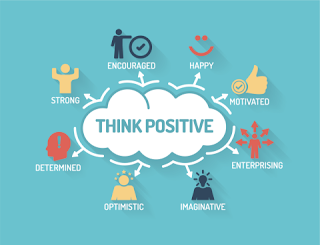Psychology study - Is it possible to be too much of a positive. Thinker?
New exploration recommends there's a drawback to an excessive amount of positive reasoning.
Having the option to think emphatically would appear to give a straight way to great psychological well-being. Hopeful individuals appear to be glad and substance with their lives. Those with a glass-half-full perspective on the world appear to be cheerful, yet additionally seem like the sort of individuals you'd prefer to become acquainted with. Who needs to associate with somebody who consistently transmits a haze of pessimism?
Maybe you have an old buddy with this bright demeanor. Throughout the long term, you've come to depend on this individual to brighten you up when you're down. During this pandemic, you've gotten particularly dependent on this person to assist you with concentrating ceaselessly from the disturbing quantities of cases and rather onto the moving stories in your web-based media feed. This individual may even propose that the measurements are exaggerated and that you ought to go on with your life as though nothing on the planet has truly changed.
As per James Collard and Mathew Fuller-Tyskiewicz of Cairnmiller Institute and Deakin University (Australia), separately, such sure deceptions may convey a danger not just for your actual well being yet additionally for your psychological well-being. In light of prior work by analyst Roy Baumeister (1989), the "Ideal Margin of Illusion" would propose it's ideal to keep up a slight tilt the positive way barely shy of conspicuously misshaping reality. The Australian creators call attention to, in any case, that such rose-hued perspectives on the world must be advantageous for such a long time. As they watch, "A more extensive perspective on psychological wellness and a more extended term viewpoint may rather bring about very various decisions about the part of positive fantasies in emotional well-being" .
You might just ask, what's the damage in reworking a terrible circumstance? Why not let yourself feel better at the time? The appropriate response, as per Collard and Fuller-Tyskiewicz, is that "basically comparing emotional wellness to passing abstract prosperity (SWB), or joy, is certifiably not an adequate model… the individuals who keep up an elevated level of prosperity through figments might be in danger of participating in pointless practices". A portion of these dangers, as expressed by the creators, can advance illness, if people accept that it's entirely fine to smoke, have unprotected sex, and take part in "dangerous" drinking. Inability to follow pandemic rules would appear to fall into this class.
Utilizing overview information from the Australian Unity Wellbeing Index, the creators acquired an example of 528 men and 751 ladies, averaging 60 years old. Members likewise had the choice of consenting to finish the overview consistently, giving key longitudinal information. There were four classifications of positive dreams tapped by the study instrument: Self-Enhancing Beliefs, Beliefs Rejecting Imperfection, Irrational Beliefs of Control, and Irrationally Optimistic Beliefs. Members appraised themselves from 0-10 on such things as "I am consistently fruitful at the things I do," and "I never commit errors."
In light of the supposition that adapting adds to the dream emotional wellness condition, the Australian analysts incorporated a measure to survey the manners in which that members dealt with testing circumstances. In essential control, an individual concurs that "I utilize my abilities to beat the issue." In optional control, when you don't really attempt to address the difficulty, you would concur that "I advise myself that I am in an ideal situation than others." Finally, in supposed "surrendered" adapting, you surrender by and large, in this way concurring with the explanation that the manner in which you adapt is to "invest energy without anyone else."
Going now to the discoveries: In the measurable investigation that put all the positive nonsensical convictions together in one higher-request factor, the creators report that took a gander at in this worldwide design, individuals with a by and large hopeful point of view appeared to be more joyful and less focused. This general outcome proposed to the analysts that there might be a dispositional inclination for individuals feeling great to state they are less on edge and pushed.
In any case, when the creators separated the general hopefulness factor, an altogether different factual picture rose. In particular, individuals scoring high on every one of the positive figment subscales taken each in turn additionally scored high on the examination's proportions of nervousness, wretchedness, and stress. In the expressions of the creators, "From the outcomes it is recommended that endeavors to advance or keep up such energy through unreasonable, or fanciful, convictions are truth be told adverse to emotional wellness." It's fine to be a self assured person, however just if that idealism has a premise as a general rule.
This arrangement of discoveries recommends that the issue with fanciful convictions is that they can require a lot of mental exertion to keep up. At the point when things are awful, you need to make a solid effort to imagine that they're acceptable. At the point when those psychological tumbling eventually fall flat, at that point the "disconfirmation of such convictions can bring about an upsetting (i.e., burdensome) experience for the person," as the creators note.
As far as confidence, positive figments appear to introduce a danger for a comparative explanation. At the point when you hold ridiculously high perspectives on yourself, you will in the long run into circumstances that challenge your mental self portrait. Accepting that you're dynamite won't set you up for circumstances in which your genuine capacities lead you to come up short. Notwithstanding certain confidence, you likewise need to have some basic aptitudes. Maybe you go into a difficult random data challenge persuaded that you can beat anybody. At the point when you end up with a dishonorable misfortune, you'll be more crushed than if you went into the challenge knowing your own personal qualities and constraints.
The outcomes from the proportions of adapting further help the possibility that a reasonable disposition serves better in keeping up psychological well-being. Individuals with high scores on the "convictions dismissing flaw" scale would in general adapt in less versatile ways with testing circumstances. As the creators watch, "This finding can be clarified by the results of silly convictions, which have been proposed to incorporate abandonment of obligations and the accusing of others for the negative functions". When something turns out badly, all in all, do you move all the fault to other people? Doing so may save your deceptive confidence, yet won't cure an awful circumstance.
To summarize, being a confident person isn't equivalent to being intellectually solid. Positive hallucinations may give you a speedy mind-set lift, however your drawn out satisfaction necessitates that you take a gander at the world through clear, not blushing, glasses.





Comments
Post a Comment